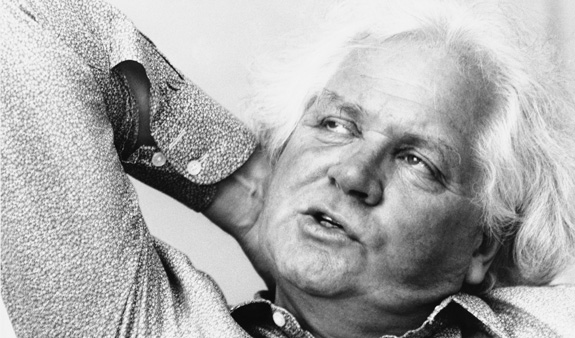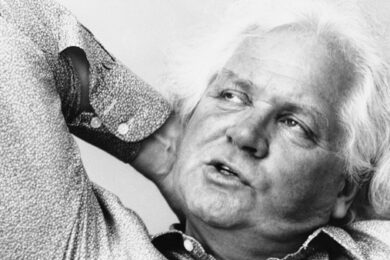Ken Russell had seen Arthur Lager’s Super-8 films [Arthur Lager: a notorious low budget filmmaker/percussionist and the first Gallon Drunk drummer], a couple of which I was in. There was an underwater one that he really liked: Rape of the Arthurapods. I think they just reminded him of the fun of homemade/homespun creativity. Most of those Arthur Lager films were made in tiny flats and tiny bedsits, yet have all that wit, flair and imagination up there on the screen.
Someone who was in touch with Russell happened to bump into me in Soho. He told me that they were trying to get The Fall of the Louse of Usher off the ground, and he thought that I might be interested in doing it. So, I was posted a script. Originally, they were trying to make it as a full-blown movie, with Roger Daltrey in it, but none of that ever happened. But Ken wanted to do it anyway. He wanted to do something different. He wanted to do it without any outside influence so that he’d have total control over it. He wanted it be fun and shoot it like a home movie in his garden. It was like he was going back to how he started out; filming with a really low budget, like The Monitor series for the BBC, where they’d just get in his car, grab the camera and go out and shoot. It was his idea that it would maybe come out on the internet in three minute episodes; a really good idea. But that didn’t happen, for whatever reason.
I finally met him at Waterloo Station in this bar, he’d come up on the train from East Boldre in the New Forest. We had a beer, a chat and he went off home again. I got the part. That was it. Most contact was conducted by fax, rather than phoning him up. Fax was his preferred form of communication. He’d even listened to some of the Gallon Drunk records. He was primarily a classical music fan, but that he’d listened to them was something.
I would go down to his home, every weekend, for a few months, stay at his place, and do it like that. When I went down there the first time, get on the train at Waterloo and get off at his local station, Brockenhurst, and he’d be waiting there with the car – ‘Hello!’. It was so strange to me: here is this famous director, the man who had made The Devils, picking me up in his old car. So we’d go back to his place, he’d make us a bite to eat, cold meat and bread I seem to remember, then we’d sit down and watch German Expressionist movies before I’d go to bed. Then first thing in the morning, at six o’clock, we’d be running around outside the house, with me playing this mad former rocker character. His gardener would be playing someone or other, his neighbours would be there, and we’d be dancing around the garden wearing plastic masks, going crazy. It was amazing down there in the countryside, really beautiful area; he really loved it, I think.
I remember when I first walked into his house; there was a bizarre mural on the wall, a collage of Nazis, Victoriana, angels and Christmas pictures all mixed together. It was quite a sight: a mad psychedelic wall of pictures and a sign over the door that read – ‘Remember to have fun today!’ With that film, the whole thing was about the enjoyment of it. He didn’t think he was making a masterpiece with a handheld video camera – that wasn’t what it was about.
It was always freezing cold in the house. One day he took me out to the garage and chained me up to a bed. There was be this very sharp knife swinging suspended above me – a very low rent The Pit And The Pendulum moment. The likelihood of it failing down seemed pretty high. It was freezing cold and there was this really large, heavy kitchen knife perilously suspended above me by this single bolt. Then he’d start swinging it. Every time the phone would go, he’d say "Back in a minute." Then the postman would turn up and he’d have a chat with him, or the dog would show up, and I was just left there. One time I was freed to go the loo in the house. I snuck into the kitchen and found a colander that I stuck that down my trousers, in case the whole contraption collapsed upon me cutting me in two. Some of his direction for those scenes was "Start screaming. Keep screaming. Stop screaming." That was hilarious.
After we’d finished shooting, we’d sit around and he’d talk about his life in cinema, or we’d sit down and listen to classical music at really mind-bending volume. He had massive speakers. Records were everywhere. I think that was part of the appeal for him of living in the country: so he could play his music at full blast. Then on Monday morning he’d drive me back to the station and I’d go back to Waterloo.
Surprisingly, we got on really well. At the time I was 35 and he was in his 70’s, but things were never forced. Despite the fact that he was very shy, he told me he was shy, we didn’t have any trouble in communicating. It was easy. Of an evening we’d watch Metropolis, have a glass of wine, then get up in the morning and inflate 30 inflatable dinosaurs that he’d bought at the local Pound Shop for the shoot.
After that, I was in Elgar: Fantasy on a Composer on a Bicycle, the remake of the classic Elgar programme he’d made years before. I got another fax or letter or something saying that he was making this programme and that he wanted me to do it. I think it was because I could play the violin, after a fashion, or that I could appear to be playing it correctly, and that he thought that I looked a bit like Elgar. And I can ride a bike. Again, it was fun going away with him. We went to the Isle of Wight. We went to great locations, Elgar’s home and so on. It was a really great summer, a really fun, lovely idyllic time down there.
He was probably comically playing everything down but he said, "When I was directing Oliver Reed we had a system, One to Five Reed. I’d tell him make it a Three, and that would be fairly smouldering. Make it a five and that would really smouldering.” There was a lot of that sort of approach to things, but what we were doing was obviously… There wasn’t the pressure that there would have been if it had been a big movie or anything like that, so maybe his approach was really different. But we would sit down, talk through it briefly, occasionally. It was mostly about him capturing the image, really.
Not so long after that shoot his cottage burnt down. He had all his stuff there. All his records, he had large collection of classical records, equipment, books, nearly everything was in there. But, there was an upside to that. He told me that he always considered himself to be a coward, a coward in physical situations and so on. He drove back to the house that night, saw that the house was on fire. His wife Elise was in there, or so he thought. Without a thought for himself he ran into the house to save her, but he couldn’t get upstairs, the flames were too fierce, the stairs had gone. So he ran back out of the house to look for another way up. There in the garden, walking towards the house was Elise, naked. Thank God she was all right; she’d been having a bath at the time and had managed to get out through a window. It must have been like a scene from one of his films. He also felt that he’d proved something to himself: his bravery. He’d lost nearly all his possessions but that seemed to be important to him.
After that, I saw him a couple of times when he came up to London. He had a couple of exhibitions of those great photographs of Teddy Boys and Teddy Girls he took in the 50s. He didn’t really talk about the photos, but a funny story did come up though. When he was living in the Lake District, and Klaus Kinski wanted Ken to direct his Paganini film. The thought that Klaus Kinski would have had to have got on a train in London, to travel up to the Lake District, to meet him at the station – that was pretty much what I had to do – and what at would have done to someone like him! Having to go all the way up there, have a chat about it, come back down and then it didn’t happen.
He had some odd stories about Oliver Reed too. There was one about trying to persuade Reed to do some project or another. Ken was always fairly eccentrically dressed, at the best of times. He’d wear red corduroys with a pink jumper, something like that. He went round to Oliver Reed’s house and Reed was horrified that he’d turned up in a pair of Mickey Mouse slippers. I think he challenged him to a duel on the spot.
With thanks to Ian Johnston



